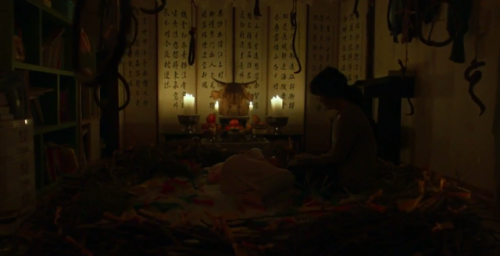#lament
Oscar Wilde (1854–1900).
O well for him who lives at ease
With garnered gold in wide domain,
Nor heeds the splashing of the rain,
The crashing down of forest trees. -
O well for him who ne'er hath known
The travail of the hungry years,
A father grey with grief and tears,
A mother weeping all alone. -
But well for him whose feet hath trod
The weary road of toil and strife,
Yet from the sorrows of his life
Builds ladders to be nearer God.
“…distress’s closed reciprocation: rapt auditor of herself, recoiling into solipsism, the persona images the other in something like her likeness.” - John Kerrigan, Motives of Woe
Post link
Golden tombstone, silver tombstone, tombstone of all gold,
see that this boy we send you has a pleasant time there.
Give him food to eat, and let him dine,
and make his bed thick, that he may lie and rest.
Do you think I’m his mother, to give him a pleasant time?
My name is Black Earth, my name is Black Tombstone,
and I make mothers part from sons and wives from husbands,
I make poor sisters part from their brothers.
Maniot lament. It is common for Greek laments to address Mother Eather, but rare for Earth to respond.
One of my favorite moments in Loki is in Episode 3, when Loki sings “Jeg Saler Min Ganger,” an Asgardian folk song, on the train on Lamentis-1. If you’ve looked up the lyrics and their translation(s), you know it’s full of metaphor and foreshadowing. But while thinking about Sylvie’s reaction to hearing the song, I realized this might also be an “On the Willows” moment.
“On the Willows” is a song in Godspell whose lyrics come from the first four verses of Psalm 137, a lament (yes, as in Lamentis) about the Israelites’ exile in Babylon. Their captors urge them to sing a song from their homeland, but the exiles rhetorically ask how they can sing one of their home’s songs in a foreign land, where no one will understand or appreciate them.
Like the exiled people of Israel, Loki and Sylvie both lost their home, Asgard. Sylvie’s timeline was pruned, and Loki knows Asgard was destroyed in Ragnarok in his timeline. All they have are memories of the culture, like language and music.
After talking about their pasts, what they can and cannot remember about their home and their families, Sylvie wakes up to find Loki singing an Asgardian folk song, to the great enjoyment of everyone else. Aside from her dismay at finding him drunk and attracting attention, she looks uncomfortable and unhappy as he directs the more melancholy part of the song to her. She might recognize the song from her own childhood. She might be the only person in the room who understands Asgardian and knows what the song is actually about.
Assuming this, she might be upset that Loki would sing it to people who do not understand it, who cannot relate to it the way they do. Or, it might be more meaningful personally, since he is addressing her with a song only she can understand, like a secret message between them. So she may feel uncomfortable because it’s a kind of intimacy that, at that point, she is not ready to welcome between them, and she may be unhappy because it reminds her of how lonely she has been and how much she misses her home.
“Yesterday”, a song by one of our favourite bands, Switchfoot, describes very well what we felt when Sal died and how we miss her SO much. So we dedicated it to her.
Flowers cut and brought inside
Black cars in a single line
Your family in suits and ties
And you’re free
The ache I feel inside
Is where the life has left your eyes
I’m alone for our last goodbye
But you’re free
I remember you like yesterday, yesterday
I still can’t believe you’re gone, oh…
I remember you like yesterday, yesterday
And until I’m with you, I’ll carry on
Adrift on your ocean floor
I feel weightless, numb, and sore
A part of you in me is torn
And you’re free
I woke from a dream last night
I dreamt that you were by my side
Reminding me I still had life
In me
I’ll carry on
Every lament is a love song
Yesterday, yesterday
I still can’t believe you’re gone
So long my friend, so long
The Torment (Flaying) of Marsyas - 1st or 2nd century Roman copy of 3rd century BC Hellenistic sculpture
Post link
“And where shall I find a hole so deep No troubled ghost may rise? There will I put my heart to sleep Wanting her face and eyes.”—Countee Cullen, from Lament(viamegairea)





